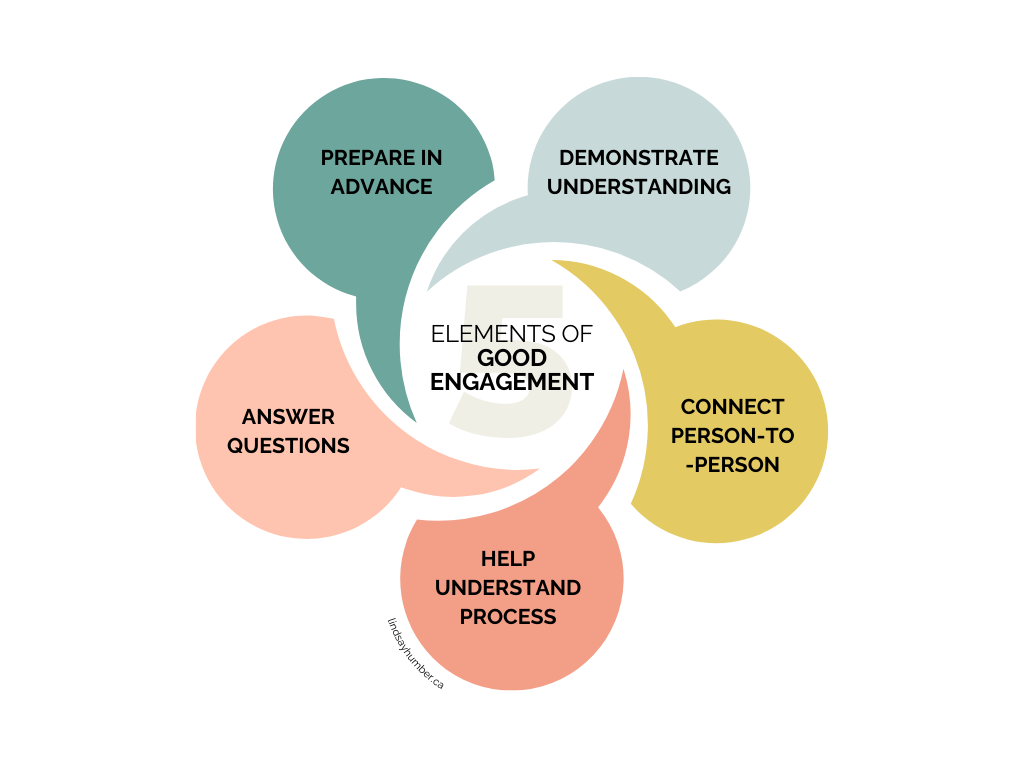What makes good engagement?
A while back I was on the receiving end of good public engagement. Since I’m rarely a participant, I thought I would share what made me feel seen, heard, and willing to participate in a discussion with someone representing a plan I deeply oppose.
The background
I wrote our provincial education minister an email outlining my concerns with Alberta’s draft K-6 curriculum. The very next day I received a call from her office asking if I had time to chat about my concerns. Sure, I thought, I would love to talk about my concerns *cue evil internal laughter*.
Fast forward to the end of the call: Shockingly, the discussion went well.
Now, this conversation could very easily have gone differently. When I realized who was at the other end of the phone, I felt my shoulders shoot up around my ears, my jaw tighten, and all my counterarguments fly to the ready.
Curriculum is a topic that I care about.
Deeply.
Because of this, it’s a topic that I can get quite heated about. It’s something that affects me personally as a parent, and politically as someone who cares about our collective future.
And yet, as I hung up the phone, I was surprised to feel that my efforts to communicate my concerns mattered. The call left me feeling that, just maybe, if we continue to advocate, the concerns being voiced across the province may actually be heard and incorporated into the curriculum.
For those of you who know me, I can hear you asking but how?! How did she get past all my carefully crafted arguments and points about how to approach education?
I asked myself the same thing.
There were some specific things she did that made me feel heard and, perhaps more importantly, made me want to listen to her.
She was prepared
She demonstrated that she had personally read my email. Not only had she read it, but she had thought in advance about what she was going to say and walked through my laundry list of criticisms, specifically addressing each one.
She demonstrated understanding
She also demonstrated that she had heard the concerns raised by other Albertans and told me what the Ministry of Education heard during consultation on the curriculum and how they were using that feedback to adjust and refine their plans.
She connected person-to-person
She connected through our shared humanity. While I can’t remember exactly what she said, it was something along the lines of “I want you to know that real people read these messages, real people listen to the feedback you provide, and real people are working to change the curriculum so that it meets the needs of Albertans. Please keep advocating.”
Connecting through our shared humanity is crucial to productive engagement.
She helped me understand how I can better engage
She walked me through the various pieces of curriculum that were being piloted at that point, showed me where to find current information on the subjects that were being delayed due to public outcry, and coached me on how to best advocate for my views and provide my feedback.
She answered my questions
She was patient, allowing me to voice all the things on my mind, and shared thoughtful responses to each question. She checked in at the end to ask if I had any other questions and provided contact information for me to use if any questions popped up after our conversation ended.
Five things that made me feel seen and respected during engagement about a plan I oppose.
Now, please don’t misinterpret this story. I haven’t become an advocate of the new curriculum. I still have concerns. I know there was a lot of behind-the-scenes discussion about sticking to key points during these conversations. I also know that the conversation could have easily gone off the rails.
But it didn’t.
Instead, I felt respected, validated, and even relieved.
All of that can be attributed to the person on the other end of the phone. She created a space in which we were able to engage in productive conversation about a topic that was emotionally laden and ripe for outrage.
I’m curious - when you think about community engagement processes that you’ve been involved in, what made YOU feel heard and understood?
Sometimes I think we can overcomplicate our responses to challenging conversations, worrying about technique or the specific words we use. For me, all it took was five, simple conditions to feel seen and respected in this conversation. Perhaps for you, other conditions are needed. I’d love to hear what they are!
Share in the comments!




